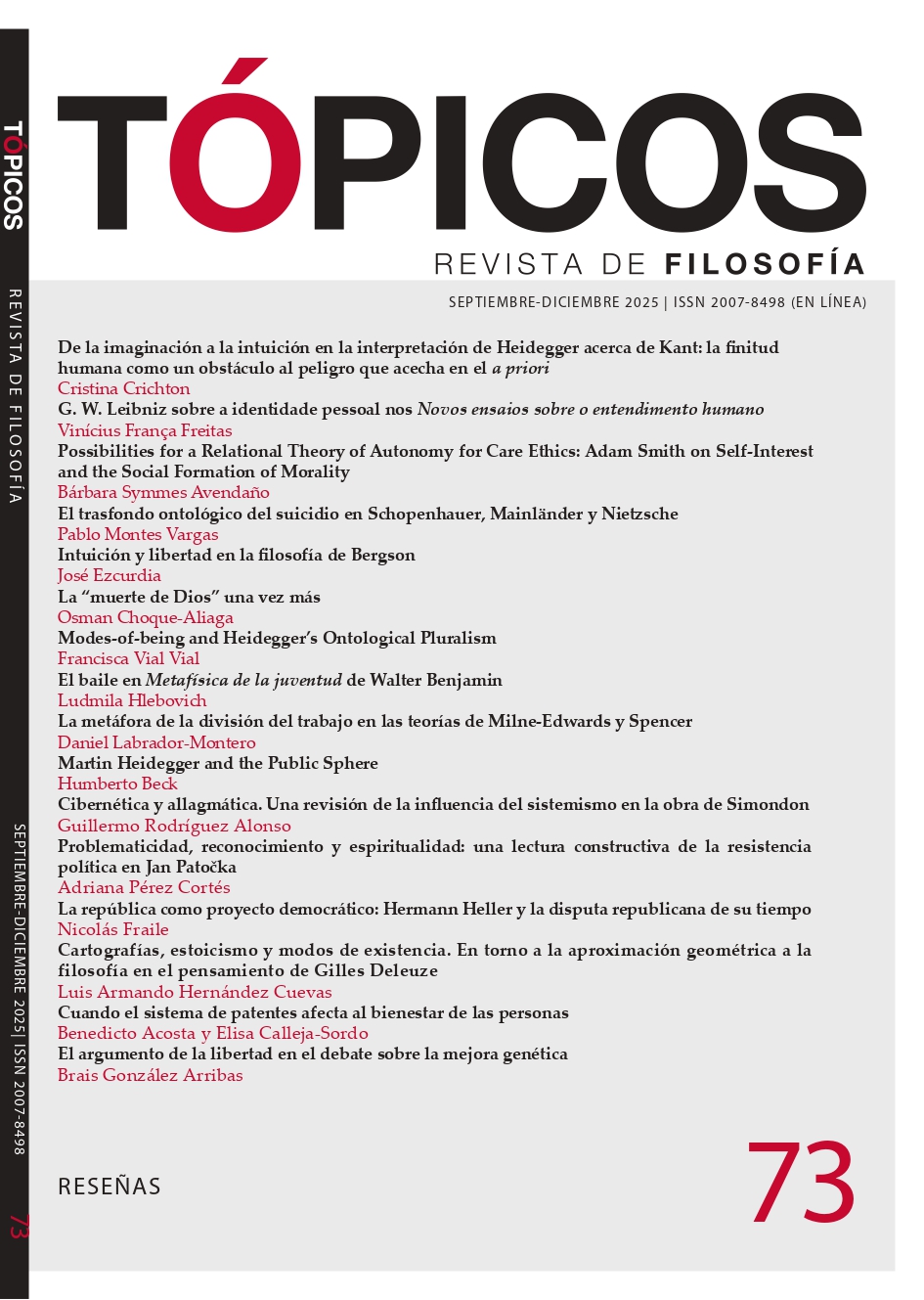Publiée 2025-08-01
Mots-clés
- modes-of-being,
- Dasein,
- Heidegger’s meta-ontology,
- ontological monism,
- ontological pluralism
- ontological difference,
- T. Carman,
- K. McDaniel,
- idealism,
- realism ...Plus
(c) Copyright Tópicos, Revista de Filosofía 2025

Ce travail est disponible sous licence Creative Commons Attribution - Pas d'Utilisation Commerciale - Pas de Modification 4.0 International.
Comment citer
Résumé
In this article, I offer an account of the concept mode-of-being that aims to define the central role that this notion plays in Heidegger’s ontology and clarify the underlying reasons of what I call the Heideggerian meta-philosophical thesis of ontological pluralism. To do so, I examine two contrasting interpretations of the notion of mode-of-being: the first one considers modes-of-being as categories of Dasein’s understanding-of-being that enable the interpretation of the ontic world of entities that is independent of the Dasein ways of understanding it. In this view a single entity can be discovered in more than one mode-of-being. By contrast, the second position considers modes-of-being as categories that metaphysically distinguish different kind of entities, so that a single entity cannot have more than one mode-of-being. Finally, I briefly sketch my proposal, which conceives modes-of-being in terms of the intrinsic ontological possibility of the entity, which manifests itself in Dasein’s understanding-of-being. I frame this discussion within the debate between a monistic ontological conception—which Heidegger criticizes and attributes to the tradition—and an ontological pluralism of modes-of-being, which I attribute to Heidegger.
Téléchargements
Références
- Agamben, G. (1999). Potentialities: Collected Essays in Philosophy. D. Heller-Roazen (ed. & trans). Stanford University Press. https://doi.org/10.1515/9780804764070
- Boedeker, E. (2005). Phenomenology. Dreyfus and Wrathall. https://doi.org/10.1002/9780470996492.ch10
- Carman, T. (2003). Heidegger’s Analytic: Interpretation, Discourse and Authenticity in Being and Time. Cambridge University Press.
- Haugeland, J. (1998). Having Thought. Harvard University Press.
- Heidegger, M. (1975). Gesamtausgabe. II. Abteilung: Vorlesungen (1919-1944). Band 24. Die Grundprobleme der Phänomenologie. (Sommersemester 1927). Vittorio Klostermann.
- Heidegger, M. (1978). Gesamtausgabe. II. Abteilung: Vorlesungen (1919-1944). Band 26. Metaphysische Anfangsgründe der Logik. (Sommersemester 1928). Vittorio Klostermann.
- Heidegger, M. (1981). Gesamtausgabe. II. Abteilung: Vorlesungen (1919-1944). Band 33. Aristoteles, Metaphysik Theta 1-3. Von Wesen und Wirklichkeit der Kraft. Vittorio Klostermann.
- Heidegger, M. (1983). Gesamtausgabe. II. Abteilung: Vorlesungen (1919-1944). Bände 29/30. Die Grundbegriffe der Metaphysik: Welt-Endlichkeit-Einsamkeit. Vittorio Klostermann.
- Heidegger, M. (1984). The Metaphysical Foundations of Logic. M. Heim (trans.). Indiana University Press. https://doi.org/10.2979/2339.0
- Heidegger, M. (1988). The Basic Problems of Phenomenology. A. Hofstadter (trans.). Indiana University Press. https://doi.org/10.2979/1179.0
- Heidegger, M. (1995a). Aristotle’s Metaphysics Θ 1-3, On the Essence and Actuality of Force. W. Brogan & P. Warnek (trans.). Indiana University Press. https://doi.org/10.2979/3734.0
- Heidegger, M. (1995b). The Fundamental Concepts of Metaphysics: World, Finitude, Solitude. W. McNeill & N. Walker (trans.). Indiana University Press. https://doi.org/10.2307/j.ctvswx8mg
- Heidegger, M. (2001). Being and Time. J. Macquarrie & E. Robinson (trans.). Blackwell Publishers.
- Heidegger, M. (2006). Sein und Zeit. Niemeyer.
- Husserl, E. (1975). Logische Untersuchungen. Martinus Nijhoff.
- Kelly, H. (2014). Heidegger the Metaphysician: Modes of being and Grundbegriffe. European Journal of Philosophy, 24(3), 670-693. https://doi.org/10.1111/ejop.12096
- McDaniel, Kris. (2009). Ways of Being. In D. Chalmers, D. Manley & R. Wasserman (eds.), Metametaphysics: New Essays on the Foundations of Ontology (pp. 290-319). Clarendon Press. https://doi.org/10.1093/oso/9780199546046.003.00010
- McDaniel, K. (2012). Heidegger’s Metaphysics of Material Beings. Philosophy and Phenomenological Research, 87(2), 332-357. https://doi.org/10.1111/phpr.12000
- McManus, D. (2012). Heidegger and the Measure of Truth. Oxford University Press. https://doi.org/10.1093/acprof:oso/9780199694877.001.0001
- McManus, D. (2013). Ontological Pluralism and the Being and Time Project. Journal of the History of Philosophy, 51(4), 651-673. https://doi.org/10.1353/hph.2013.0079
- Ramos dos Reis, R. (2014). Aspectos da modalidade. A noção de possibilidade na fenomenologia hermenêutica. Via Verita.
- Ramos dos Reis, R. (2017). Quantificação existencial e o problema da necessidade manifesta no pluralismo ontológico em Ser e Tempo de Martin Heidegger. Revista Portuguesa de Filosofia, 73(3-4), 1021-1034. https://doi.org/10.17990/RPF/2017_73_3_1021
- Ramos dos Reis, R. (2020). Ways of Being and Expressivity. Estudios de Filosofia, 61, 11-33. https://doi.org/10.17533/udea.ef.n61a03
- Turner, J. (2010). Ontological Pluralism. The Journal of Philosophy, 107, 5-34. https://doi.org/10.5840/jphil201010716
- Vigo, A. (2014). Arqueología y aleteiología. Estudios heideggerianos. Logos Verlag. https://doi.org/10.30819/3804
- Wrathall, M. A. (2021). The Cambridge Heidegger Lexicon. Cambridge University Press. https://doi.org/10.1017/9780511843778





